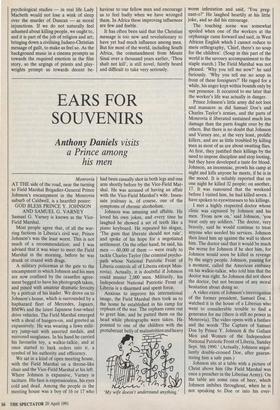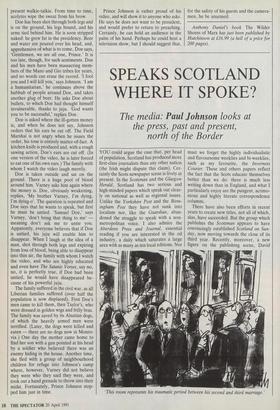EARS FOR SOUVENIRS
Anthony Daniels visits
a Prince among his men
Monrovia AT THE side of the road, near the turning to Field Marshal Brigadier-General Prince Johnson's encampment in the Monrovia suburb of Caldwell, is a heartfelt poster: GOD BLESS PRINCE Y. JOHNSON AND SAMUEL G. VARNEY Samuel G. Varney is known as the Vice- Field Marshal.
Most people agree that, of all the war- ring factions in Liberia's civil war, Prince Johnson's was the least worst. This is not much of a recommendation; and I was advised that it was wiser to meet the Field Marshal in the morning, before he was drunk or crazed with drugs.
A military policeman at the gate to the encampment in which Johnson and his men are now confined by the ceasefire agree- ment begged to have his photograph taken, and posed with amateur dramatic ferocity by a portrait of his leader. We drove on to Johnson's house, which is surrounded by a haphazard fleet of Mercedes, Jaguars, BMWs and the latest Japanese four-wheel drive vehicles. The Field Marshal emerged with a shoal of hangers-on, and greeted us expansively. He was wearing a fawn milit- ary jump-suit with assorted medals, and mirrored sunglasses. In his hand he carried his favourite toy, a walkie-talkie, and at once started to bark orders into it, a symbol of his authority and efficiency.
We sat in a kind of open meeting house, with the Field Marshal on a throne-like chair and the Vice-Field Marshal at his left. Where Johnson is expansive, Varney is taciturn. His face is expressionless, his eyes cold and dead. Among the people in the meeting house was a boy of 16 or 17 who had been casually shot in both legs and one arm shortly before by the Vice-Field Mar- shal. He was accused of having an affair with the Vice-Field Marshal's wife. Insen- sate jealousy is, of course, one of the symptoms of chronic alcoholism.
Johnson was amusing and affable. He loved his own jokes, and every time he laughed he showed a set of teeth like a piano keyboard. He repeated his slogan, 'The guns that liberate should not rule', and spoke of his hope for a negotiated settlement. On the other hand, he said, his men — 60,000 of them — were ready to tackle Charles Taylor (the criminal psycho- path whose National Patriotic Front of Liberia controls all of Liberia except Mon- rovia). Actually, it is doubtful if Johnson could muster 2,000 men. Militarily, his Independent National Patriotic Front of Liberia is a disarmed and spent force.
Anxious to improve his international image, the Field Marshal then took us to the home he established in his camp for orphans of the war. The orphans came out to greet him, and he patted them on the head while photographs were taken. He. pointed to one of the children with the protuberant belly of malnutrition and heavy 'My wife doesn't understand anything.' worm infestation and said, 'You preg- nant-o?' He laughed heartily at his little joke, and so did his entourage.
The touching scene was somewhat spoiled when one of the workers at the orphanage came forward and said, in West African English which I cannot reduce to mere orthography, 'Chief, there's no soup for the children'. (Soup in this part of the world is the savoury accompaniment to the staple starch.) The Field Marshal was not pleased. 'Why you tell me now?' he said furiously. 'Why you tell me no soup in front of these foreigners?' He raged for a while, his anger kept within bounds only by our presence. It occurred to me later that the worker's life was actually in danger.
Prince Johnson's little army did not loot and massacre as did Samuel Doe's and Charles Taylor's armies, and the parts of Monrovia it liberated sustained much less damage than the parts fought over by the others. But there is no doubt that Johnson and Varney are, at the very least, prolific killers, and are as little troubled by killing men as most of us are about swatting flies. At first, they justified their killings by the need to impose discipline and stop looting, btit they have developed a taste for blood. Johnson, an insomniac, prowls his camp at night and kills anyone he meets, if he is in the mood. It is reliably reported that on one night he killed 32 people; on another, 17. It was rumoured that the weekend before I visited him, he had killed seven. I have spoken to eyewitnesses to his killings.
I met a highly respected. doctor whose clinic was captured by Johnson and his men. 'From now on,' said Johnson, 'you treat only my soldiers.' The doctor, very bravely, said he would continue to treat anyone who needed his services. Johnson then lined him up against the wall to shoot him. The doctor said that it would be much the worse for Johnson if he shot him, for Johnson would soon be killed in revenge by the angry people. Johnson, pausing for a moment, called the American embassy on his walkie-talkie, who told him that the doctor was right. So Johnson did not shoot the doctor, but not because of any moral hesitation about doing so.
A video exists of Johnson's interrogation of the former president, Samuel Doe. I watched it in the house of a Liberian who went to considerable trouble to find a generator for me (there is still no power in Monrovia). The video opens with a fanfare and the words 'The Capture of Samuel Doe by Prince Y. Johnson & the Gallant Men and Women of the Independent National Patriotic Front of Liberia, Sunday Sept. 9th 1990.' (Actually, Johnson ungal- lantly double-crossed Doe, after guaran- teeing him a safe pass.) Johnson sits at a table with a picture of Christ above him (the Field Marshal was once a preacher in the Liberian Army). On the table are some cans of beer, which Johnson imbibes throughout, when he is not speaking to Doe or into his ever- present walkie-talkie. From time to time, acolytes wipe the sweat from his brow.
Doe has been shot through both legs and is on the ground, his legs bound, and his arms tied behind him. He is soon stripped naked: he grew fat in the presidency. Beer and water are poured over his head, and, apprehensive of what is to come, Doe says, 'Gentlemen, we are all one, Prince.' It is too late, though, for such sentiments. Doe and his men have been massacring mem- bers of the Mano and Gio tribes for years, and no words can erase the record. fool you and I will kill you,' says Johnson. 'I am a humanitarian,' he continues above the hubbub of people around Doe, and takes another glug of beer. He asks Doe about bullets, to which Doe had thought himself invulnerable, thanks to juju. 'God wants you to be successful,' replies Doe.
Doe is asked where the ill-gotten money is, and when he does not say, Johnson orders that his ears be cut off. The Field Marshal is not angry when he issues the order, his tone is entirely matter-of-fact. A kitchen knife is produced and, with a rough sawing action, Doe's ears are cut off. (In one version of the video, he is later forced to eat one of his own ears.) The family with whom I watch the video laugh merrily.
Doe is taken outside and sat on the ground. There is a huge pool of blood around him. Varney asks him again where the money is. Doe, obviously weakening, replies, 'My brother Varney, I'm dying, I'm dying-o'. The question is repeated and Doe says that he wants to speak, but first he must be untied. 'Samuel Doe,' says Varney, 'don't bring that thing to me' meaning don't ask me to untie you. Apparently, everyone believes that if Doe is untied, his juju will enable him to disappear. When I laugh at the idea of a man, shot through both legs and expiring from loss of blood, being able to disappear into thin air, the family with whom I watch the video, and who are highly educated and even have The Satanic Verses, say no, no, it is perfectly true, if Doe had been untied, he would have disappeared be- cause of his powerful juju.
The family suffered in the civil war, as all Liberian families suffered (over half the population is now displaced). First Doe's men came to kill them, then Taylor's, who were dressed in golden wigs and frilly bras. The family was saved by its Alsatian dogs, of which the heavily armed men were terrified. (Later, the dogs were killed and eaten — there are no dogs now in Monro- via.) One day the mother came home to find her son with a gun pointed at his head by a soldier who believed there was an enemy hiding in the house. Another time, she fled with a group of neighbourhood children for refuge into Johnson's camp where, however, Varney did not believe they were who they said they were, and took out a hand grenade to throw into their midst. Fortunately, Prince Johnson stop- ped him just in time. Prince Johnson is rather proud of his video, and will show it to anyone who asks. He says he does not want to be president, and would prefer to return to preaching. Certainly, he can hold an audience in the palm of his hand. Perhaps he could host a television show, but I should suggest that, for the safety of his guests and the camera- men, he be unarmed.
Anthony Daniel's book The Wilder Shores of Marx has just been published by Hutchinson at f16.99 (a hell of a price for 200 pages).



























































 Previous page
Previous page